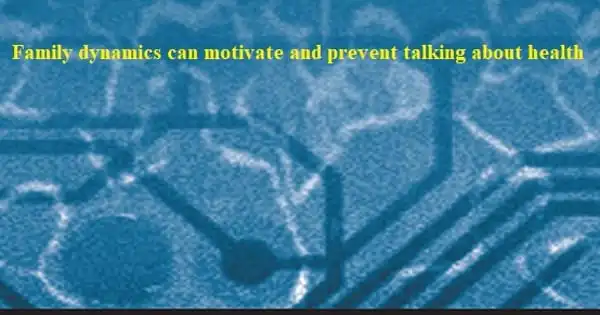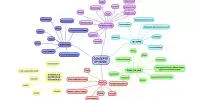For many emerging people, the years between the ages of 18 and 25 represent a time in their lives when they can explore what important to them and take new legal rights and duties, such as their own private health information and medical decision-making. However, this transition to independence can lead to tense family dynamics, especially if emerging adults continue to be covered by their parents’ health insurance plans.
According to a new study from Iowa State University, open discussion and reciprocal information sharing between parents and emerging adults lowers barriers to talking about health, which can lead to better overall health outcomes for the emerging adult.
“If you’re an emerging adult who is concerned about what your parent might think, especially if it’s a stigmatized health issue or your choices in dealing with the health issue do not align with your parent’s values, chances are you’ll avoid seeking treatment or look for an alternative route,” said Katherine Rafferty, an associate teaching professor of psychology and communication studies at Iowa State University and co-author of the new publication publish.
Given gender norms and the different ways men and women are socialized, it kind of makes sense that in a conventional home, there might be this desire or readiness to be honest with mom more so than dad.
Katherine Rafferty
In the United States, turning 18 entitles a person to make medical decisions without parental agreement. They also gain legal ownership of their personal health information. However, under the Affordable Care Act, adult children can remain on their parents’ health insurance coverage until they reach the age of 26.
“When mom and dad are paying for their adult child’s health, any time they go to the doctor or seek medical care, it lends itself to the necessity for a talk,” Rafferty explained. Rafferty, along with Associate Professor of English Tina Coffelt and a research team of undergraduate students, surveyed more than 300 college students to better understand how conversations about private health information unfolded between emerging adults and their parents. The majority were on their parents’ health insurance plans and came from a traditional, nuclear family with a mother and father.
Relational quality, reciprocity, and conformance were discovered to be three key elements that influence whether an emerging adult shares health information to a parent. “Simply put, how well do I get along with my parents? When I was growing up, did my parents share any of their health-related facts or decisions with me? Did I grow up in a family where health issues were discussed? Were my parents accepting of diversity or did they expect me to adhere to family norms?” Rafferty elaborated.
Fig: Family dynamics can motivate and prevent talking about health
Relational Quality
The researchers discovered that emerging people who see their parents as open and respectful are more inclined to discuss health difficulties, but these discussions occur significantly more frequently with moms than with fathers.
“Given gender norms and the different ways men and women are socialized, it kind of makes sense that in a conventional home, there might be this desire or readiness to be honest with mom more so than dad,” Rafferty explained.
Mothers, according to Rafferty and the other researchers, are often the ones who keep track of doctor’s visits and health information in families. Sharing health information with mom as an emerging adult may simply be a continuation of previous practices, building on previously shared knowledge about the emerging adult’s health history.
Reciprocity
The researchers discovered that if their parents exhibited this conduct early in the relationship, emerging adults were far more inclined to talk to their parents about their health. Reciprocal information sharing, according to Rafferty, also helps emerging adults better manage their health, whether they’re updating their family health history at the doctor’s office or seeking extra care.
“We’re learning more and more about certain types of cancers and mental health issues that have genetic components, and it’s critical in those cases, especially for emerging adults, to know what they’re predisposed to, that they’re not alone, and that they have their parents’ support,” Rafferty said.
Conformity Orientation
The researchers discovered that stigma associated with specific health subjects (e.g., sexual habits) had a significant impact on health disclosures. Emerging adults who were concerned about feeling guilty or who wanted to maintain a relationship with their father were more likely to keep private health information from him, especially if they hailed from homes with “high conformance attitudes.” This, however, had no bearing on a conversation with a mother concerning private health matters.
“With a high conformity orientation, there’s a lot of pressure to follow by family rules, usually from a father figure in a conventional household,” Rafferty stated, using the character of Jack Byrnes (Robert De Niro) from the film “Meet the Parents” as an example. There is a presumption about what one can and cannot discuss with family members.”
Rafferty cited “Modern Family” as an example of a low conformity approach. Family members with varied lifestyles are accepted and embraced in this show. The new findings underline the importance of family dynamics in determining whether or not emerging adults share private health information and engage their parents in medical decisions. Early on, open and courteous interactions, as well as reciprocal information sharing, can improve an emerging adult’s general health and lessen family conflict.
Rafferty, whose study focuses on parents of medically complicated children, also advised parents to involve their children in health management. “Rather than just waiting for mom or dad to say, ‘OK, it’s time to take your insulin,’ teach your child how to inject their insulin or figure out what things to consume to counteract low blood sugar,” she noted.
Rafferty believes that involving youngsters in their own health management and making medical decisions jointly might ease the transition to emerging adulthood. When dealing with a health issue, emerging adults will feel more confident and will know they have support.
“If COVID has taught us anything, it’s that health difficulties will affect us all at some point,” Rafferty remarked. “We’ve all had to take a step back and reassess our physical health and well-being. How parents model this for their children will influence how they discuss and approach health issues as they grow into young people.”















